Elvis Presley's death deprives our country of a part of itself. He was unique and irreplaceable. More than 20 years ago, he burst upon the scene with an impact that was unprecedented and will probably never be equalled. His music and his personality, fusing the styles of white country and black rhythm and blues, permanently changed the face of American popular culture. - President Jimmy Carter - August 16, 1977
Joe Esposito is best known as a key member of the "Memphis Mafia' and one of Elvis' closest friends. Joe met Elvis in 1958 when they were both in the army. They met in Germany and formed a friendship over playing games of football and taking trips to Paris. Before leaving the service Elvis asked Joe to work for him, from then on their friendship would last almost two decades with Esposito's main role being road-manager. Joe Esposito would be there to the very end...
 |
August 15th 1977.
Elvis was sick, exhausted, and numbed. He no longer saw the world as full of the challenges that once fueled his remarkable zest.
The challenges were there; it was Elvis who had lost his taste for adventures, and with them, his reason for being.
The night before Elvis died, he called tour manager Tom Hulett. The phone rang just as Tom was leaving to join the Colonel in Palm Springs so they could fly to Portland, Maine, the first stop of the tour that didn't happen.
Rick was on the line. "Elvis wants to talk to you," he said.
Elvis had never called Tom at home before.
"Hi, what's up?" Tom said.
"How's the tour?" Elvis asked.
"Sold out," Tom said.
"Really?"
"Yeah," Tom repeated, "sold out."
"You're sure?" Elvis asked again.
"Yeah, we're sold out."
"Good," Elvis said. "When are you going out?"
"I'm leaving tonight to meet the Colonel in Vegas," Tom answered. "Are you okay?"
"Okay," Elvis said, as much to convince himself as Tom. |
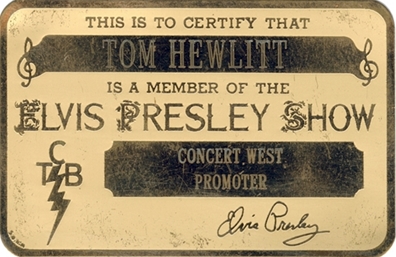 |
"I'm playing some racquetball, getting ready for the tour. I'll see you there."
They said goodbye and hung up.
August 16th 1977 Late Afternoon
The emergency team at Memphis's Baptist Memorial Hospital were alerted that someone important who had stopped breathing was coming in, so they were waiting outside. They pulled Elvis from the ambulance and ran with him into the emergency room with Charlie Hodge, Dr. Nick, and me at their heels.
Charlie and I were escorted to a private waiting room near the emergency room. Dr. Nick rushed with the hospital personnel into the ER. Soon after, Billy Smith, Al Strada, and David Stanley showed up. Sam Thompson stayed behind at Graceland with Vernon, Minnie Mae, and Lisa.
We waited in that room for twenty to thirty minutes, barely talking.
Finally, Dr. Nick entered, his face blank and as pale as his shock of white hair. It was over.
"He's gone" Dr. Nick said. "He's no longer here."
Everyone burst into tears and held on to one another.
We didn't discuss the cause of Elvis's death.
No one mentioned it, and I doubt if anyone even thought of it.
For a few blank moments, we were at a loss. We had no contingency plans.
Then I put shock, grief, and confusion aside. To steady myself, I focused on my job: to do the funeral and do it right.
"Do you want to make the announcement?" Maurice Elliot, the hospital public relations man, asked me.
Dr. Nick intervened. "Wait," he said. "Don't make the announcement until I get to Graceland and talk to Vernon."
He rushed out of the hospital, and the ambulance driver dropped him at the house. He didn't want Vernon to learn of his son's death over the radio.
August 18, 1977, 3pm
The air shimmered with the heat haze of Memphis, Tennessee, in high summer.
Inside Graceland, Elvis's family and friends, more than 250 closely packed sweltering bodies in all, were seated on folding chairs we had set up in the long blue-and-white living room.
Vernon Presley's preacher competed for air space with the loud, futile hum of air conditioners. Improvised paper fans waved listlessly, and eyes squinted with the effort of focusing on the pastor's eulogy. Elvis had never set foot in the man's church, but Vernon was burying his only child, and his wishes had to be honored.
The pastor confirmed, "Elvis was a wonderful person. He's with God now. He did the best he could while he was alive. His daughter will miss him, and so will his other family and friends."
August 16, 2021
Elvis lies with his mother, father, and grandmother in Memphis.
A plaque by Graceland's meditation garden honors the memory of his twin brother, Jesse Garon.
Every year on August 16, a candlelight ceremony is held on the grounds, across the street from the Lisa Marie and the Jet-Star, both of which are on permanent display as part of the Graceland tour.
Every year fans new and old continue to pledge love to their idol in scribbled messages that cover Graceland's vast stone wall.
Yes, Elvis came to a sad, tragic end. But that was only a small part of Elvis's life.
We tend to remember people as they were at the end, and Elvis's last few years were certainly not his best.
Elvis certainly wasn't the bizarre, tormented creature the media like to portray.
Yes, there were creative and personal disappointments, but most of Elvis's life and career was exciting and full of fun.
Elvis was not only blessed with unparalleled singing and performing gifts, he was extraordinary in his kindness, generosity, and insight.
Elvis made it easy for us to forget who he was to the world. One afternoon, I was painting fences with him on the ranch. Then, a few days later, he was performing for almost sixty thousand people at the Houston Astrodome. "OmiGod!" I'd thought. "I forgot who this guy is!"
Almost everyone who knew the man felt the same way. Everyone of us felt close to Elvis and, even more pertinent, we each knew that he understood us in a way no one else did.
Success and show business are wonderful, but they bring tremendous responsibility and temptation. Everyone's feelings are tuned to you and only you. You walk into the kitchen to have break fast, and everyone there is looking at you, waiting to see how you feel and what you're going to say and do. Elvis loved being Elvis
Presley and he loved his lifestyle. He had fun!
Elvis enjoyed his privileges fully and he was grateful. But he never forgot who he was and where he'd come from. He tried to use those gifts to make himself and others happy. If he showed any favoritism at all, it wasn't to the wealthy and powerful, but to the needy and helpless.
"Who was Elvis?" people ask me. 'He was a good guy," I say. "There was no harm in Elvis, but there was an awful lot of love." What more can I tell them?
That he got mixed up in a business that destroyed him?
That he had a medical problem that wasn't recognized at the time for what it was?
That he was caught in a world that few of us could navigate successfully?
Elvis was happiest when faced with a challenge, when he didn't know if he could make it or not.
Because of Elvis, his friends had the opportunity to know other extraordinary people of our times. Yet none could match him.
The legend of Elvis Presley is so indelibly engraved in the mass consciousness that his image appeared on U.S. postage stamps.
His music and image still features in brand new mainstream movies more than forty years after his death.
Elvis' music, style, image and personal generosity are still major reference points for new performers.
Graceland is the second most-visited home in the USA, second only to The White House.
More than a million Elvis fans have visited Graceland since its opening in 1982
Elvis has even claimed Number One albums and singles in this new milennium.
As I recollect my life with Elvis, it seems that not a day goes by without mention of his name.
Four decades after his death, Elvis Presley still reigns unchallenged as the King of rock 'n' roll, the greatest superstar the world has ever known.
All the crude jokes and ugly rumors can't change the fact that there never was anyone like him and there never will be an other again.
Elvis was the most extraordinary ordinary man.
Long Live ELVIS.
Spotlight by Piers Beagley
-Copyright EIN August 16th 2021. Do Not reprint or republish without permission.
Click here to comment on this article
Elvis’ best friends, Jerry Schilling, Linda Thompson, George Klein, Alan Fortas, Marty Lacker and Larry Geller reminisce about his life.
JERRY SCHILLING - "Losing Elvis was the greatest loss I've ever suffered"
Once in Graceland there was a moment when I found myself alone in the living room with Elvis where he sat by himself playing the piano.
The powerful, beautiful music had drawn me up from my room in the basement, but as I got closer, I thought maybe I was intruding on something personal. Elvis was lost in his singing and playing, and I didn't want to interrupt his private moment. But he happened to look up and see me and with just a hint of a smile on his face he gave me the faintest of nods to let me know it was OK to stay and listen. He turned back to the keyboard and continued singing one of his favourites, "You'll Never walk Alone".
Elvis was my friend, and I received more from him than from any other person I've known. I can only hope that I gave something of substance back to him. Losing him was the greatest loss I've ever suffered. But it also has occurred to me that those words I once heard Elvis sing in the Graceland music room have turned out to be absolutely true.
With everything he gave me, and with all the love, friends, memories, and music in my life - I don't ever walk alone.
LINDA THOMPSON - "I am saddened to this day that he left us far too early"
After Elvis died I sat on the landing of the stairs leading up to his bedroom with Billy Smith, Billy’s wife, Jo, and another of Elvis’ cousins, Patsy Gamble, as his body lay in state at the base of the stairs for public viewing. The four of us, who understood his heart and his humor, sat for hours, laughing and crying hysterically, and remembering the man we’d all loved so very deeply. We talked about all the good times, riding on the golf carts around Graceland, and Elvis’ kindness and generosity, and his uniquely irreverent sense of humor.
We will never know what might have been if Elvis had been given the gift of a longer life. I am saddened to this day that he left us far too early. I, like millions of others, would just be happy to know he was still a living presence in our world, no matter what he might now be doing, and no matter who he might choose to be with.
Within the first week after Elvis passed away, I started dreaming about him. Not every night, but often enough that, strange as this may sound, I came to feel like there was a plane of consciousness on which we could visit. As if I were suspended between life and death when asleep, in a different realm, and there we could be together. And while I realize now that it was probably all in my imagination, I’m grateful that I had those moments with him, even just in my dreams. I think it was what I needed at the time in order to say my final goodbye.
GEORGE KLEIN - "Elvis was the most generous man I've ever known"
Elvis was the most talented man I've ever known, he was the most generous man I've ever known, and he was the smartest man I've ever known.
But on a personal level, what I loved most about Elvis Presley was the amazing quality of his friendship. I've never felt as cared for, supported, and accepted as I did with him, and I've never felt as devoted to anyone as I was to him. I only hope he had some sense of how much I loved him as a friend, and how much I appreciated everything he ever did for me.
There'll never be another Elvis, and there'll never be another person like him in my life. I just consider myself a lucky, lucky man to be able to say that Elvis Presley was a friend of mine.
I don't think I'll ever really say goodbye to Elvis. But, just like at the end of all my radio shows, I can sign off and send us back to what lives on—his music:
"Ladies and gentlemen, the sun never sets on a legend, and there'll always be a TCB on the Lisa Marie. The United States Of America has had many presidents but only one King, and here he is to sing. . ."
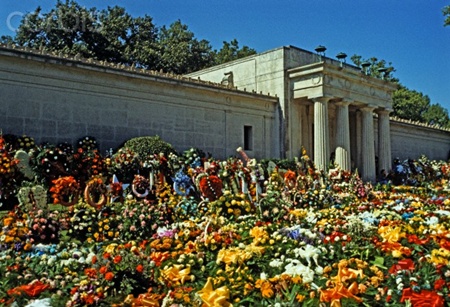 |
ALAN FORTAS - "Elvis proved that to be poor and Southern did not mean you didn't count"
In a few short years almost single-handedly Elvis changed the attitudes of the world. Not only about sexuality and "race music," but about class barriers, taste, and Southerners themselves. To those who never knew or who had forgotten, Elvis proved that to be poor and Southern did not mean you didn't count.
When he died, country music, once the voice of the Southern working class and the illiterate, was well on its way to mass acceptance all around the world. The surprise was that his death was a catharsis not just for the poor or the working class of the South, but also for the middle class of the East, the West, the North.
Elvis was simply an immensely talented, intensely troubled man. No saint. No satyr. Elvis's life was a dream with no way out but the end. Yet, for me, it will never be over. Like everybody else, I still miss him.
But for better or worse, I also have a part of Elvis inside of me. Everybody wants a touch of Elvis. And nobody wants to let go.
LAMAR FIKE - "The way Elvis was doing everything. You just can’t keep going like that."
Elvis never thought of himself as a pioneer. He didn’t understand the term. He just happened to be there. Elvis used to say, “There’s room for everybody in this business” - and there was. He used to tell artists that. He’d say, “Hey, don’t worry about me. Worry about yourself.”
Everybody out there today that’s in rock ‘n’ roll owes their career to Elvis. He was a nova exploding off of the old star and becoming thousands of times brighter than the original, and the brightness lights up everything around. He was a child of destiny, regardless of whether he wanted it or not.
I was with Elvis for 23 years. I talked to him the day before he died while we were setting up his next tour. I don’t think Elvis had any inkling he was going to die. His mother’s side of the family was so short-lived that, you know, the indications were all there. The way he was doing everything. You just can’t keep going like that. Nobody can keep going like that.
Then all of a sudden, I lost him. It was just devastating. You don’t get over that easily.
When I lost Elvis, it was as hard as losing my Father. It was devastating. I still do things today that come from being with Elvis. I unconsciously do stuff. Somebody likes one of my watches, I’ll take it off and give it to them.
I still miss Elvis. My god, I miss him every day of my life. Forty years on it’s something that goes on every day. I still dream of Elvis every day of my life since he passed. The intensity of 23 years with somebody is pretty strong.
MARTY LACKER - "This world is a better place for Elvis having been here"
Elvis had an immense thirst for a knowledge of life, the meaning of it, and how it began.
He constantly read about religions and the supernatural. Elvis was curious about reincarnation and life after death. He had a great faith in God upon which he built his life, but he was in no hurry to find out what death was like.
Elvis was truly a remarkable and special human being. I am convinced that he was put on this earth for a special purpose, but he was just as much a human being as any of us.
He suffered from human faults and frailties. He had the material things about which people dream, but often they were not enough to make him happy.
The charisma and magnetism for which he was known was real. He had a smile that could turn the whole world on, and he had a strong hold over those who were associated with him.
It was hard to say no to Elvis, and there was no way I could tell him a lie. All he had to do was look at me and he would know immediately if I was trying to make him believe something that wasn't completely true. His eyes were probably the most expressive part of him.
They told us when he was happy, mischievous or angry.
Sometimes I thought he tried to change their expressions to hide his true thoughts, but he was never able to quite do it.
This world is a better place for Elvis Presley's having been here, and I know that as long as there is one of us alive, whose life he touched, he will still be alive, but I miss him.
I miss the years of kindness and the years of love, and Elvis had a lot of love for all of us.
I remember, God how I remember, the happy days of companionship, the days when we felt so very close to each other.
Ain't it funny how time slips away?
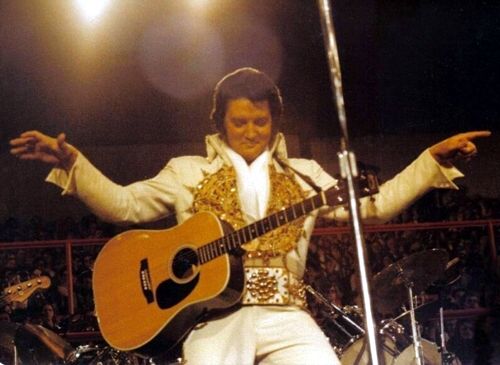 |
LARRY GELLER - "We're all going back home... someday"
Lonely rivers flow to the sea, to the sea,
To the open arms of the sea.
Lonely rivers sigh, wait for me,
wait for me.
I'll be coming home, wait for me.
From the first time I heard Elvis sing this song in early 1977, I had the strangest feeling that he was singing to his mother. It was as if somewhere deep in his soul he knew he'd be going home soon.
There was an indescribable aura around Elvis when he sang "Unchained Melody," something I'd never experienced before, something I know was felt by everyone in the audience.
A lone spotlight beamed on Elvis in the darkened concert hall. The only sound was his voice and the piano he was playing. The musicians were silent; the whole audience seemed to be holding their breath. Everyone was transfixed.
I never heard his voice so vibrant, so resonant, as if his very soul was crying out.
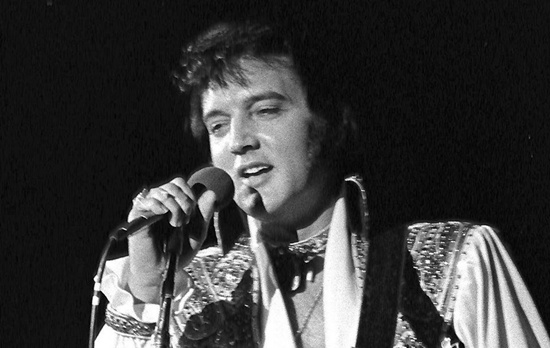 |
A little over ten years earlier, upstairs in Elvis' bedroom at Graceland, he and I were talking about his mother's passing in 1958. It was the most turbulent, disoriented and confusing time in his life: drafted into the Army, leaving the career that had exploded two years earlier, uncertain what the future would bring.
Elvis became very quiet, lost in his memories.
"My mother was the light of my life, my best friend; I mean, she's the one I could always go to ... man, that's a blow you can never really get over.
I can still hear her voice telling me just like it was yesterday, "Honey, God took your little brother back home to Heaven 'cause it was part of His plan. He has a plan for everybody: for your daddy, for me... and for you too, Elvis. Someday I'll be goin' back home, and someday Daddy's gonna go home. And even someday a long, long time from now - God's gonna bring you home, too. And then we'll all be together again, all of us back home in heaven.”
Elvis looked at me intently. He leaned forward and with conviction in his voice, said, "And that's exactly what I believe, we're all going back home... someday."
The candlelight vigil on the anniversary of his passing is an event that takes place nowhere else in the celebrity world. The solemn procession of flickering candles advances slowly in the dark, past rows of wreaths and flowered sculptures from fans around the world, as echoes of Elvis play softly in the background.
The lights move through the Meditation Garden, carried by tens of thousands of people from children to the elderly, many placing flowers or teddy bears on his grave. Some are weeping, some are seeking physical or spiritual healing; all are seeking a connection to Elvis. An eternal flame is burning.
The atmosphere is mystical, more akin to a pilgrimage to a holy shrine or a visit to a loved one's grave than adulation of a celebrity.
The people sense there is more to him than they know, an honesty and innocence that shone through the glitz and glamour.
They seem to understand how much he cared about them, too.
Elvis, like all of us, lives on in the memories of those who love him. |
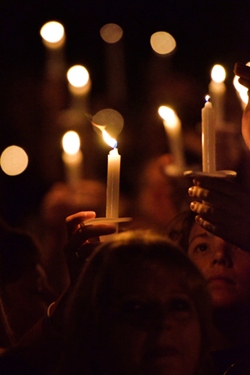 |
Spotlight by Piers Beagley
-Copyright EIN August 16th 2021. Do Not reprint or republish without permission.
Click here to comment on this article
Joe Esposito EIN Interview: Joe Esposito (RIP) is best known as a key member of the "Memphis Mafia' and one of Elvis' closest friends. Joe met Elvis in 1958 when they were both in the army. They met in Germany and formed a friendship over playing games of football and taking trips to Paris. Before leaving the service Elvis asked Joe to work for him, from then on their friendship would last almost two decades with Esposito's main role being road-manager.
In 2001 EIN's Nigel Patterson met up with Joe Esposito in Canberra. He had agreed to give us 15 minutes of his time, but ended up talking for over an hour. This interview was featured in our EIN Fan Club newsletter but not on-line.
Joe Esposito January 22, 1938 - November 23,2016 - RIP.
Go here for Joe Esposito's delightful stories of sharing his life with Elvis and the special friendship they had.
(Interviews, Source;ElvisInformationNetwork) |
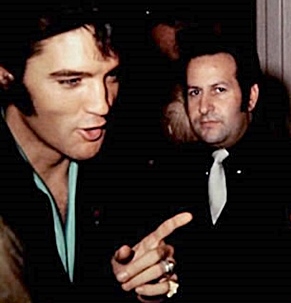 |
ELVIS Forever - 2019: - August 16th, 1956, Elvis arrived on board an American Airlines flight to Los Angeles International airport in order to start work on his first film role, The Reno Brothers soon to be renamed 'Love Me Tender'.
Elvis was only 21 years old and at the start of his incredible trajectory to become the world's biggest superstar.
Little did Elvis know that he was already halfway through his all too-short life on earth.
In the same month Elvis would tell fans, "I've been lucky. You know something? I just feel sometimes like it's all a dream, like I'll rub my eyes and wake up and it will be over. I hope not. I hope it never happens. I hope it never ends"
Sadly, just 21 years later, it would end far too soon.
Forty two years on we all are once again thinking about tragic end to Elvis' incredible life and how much he did for us in his all too short life-time.
|
 |
